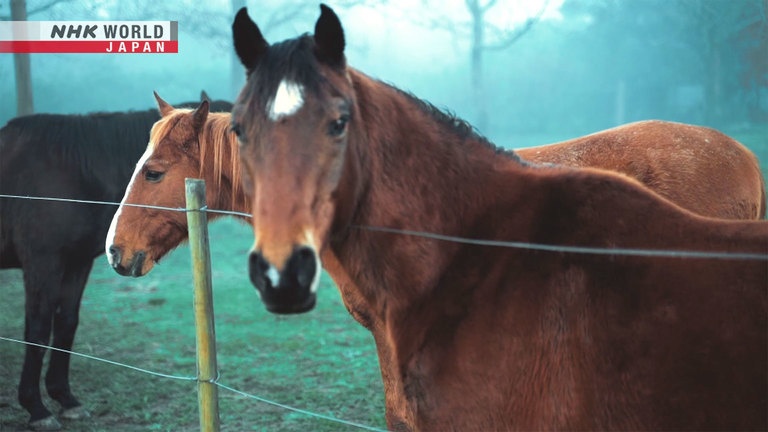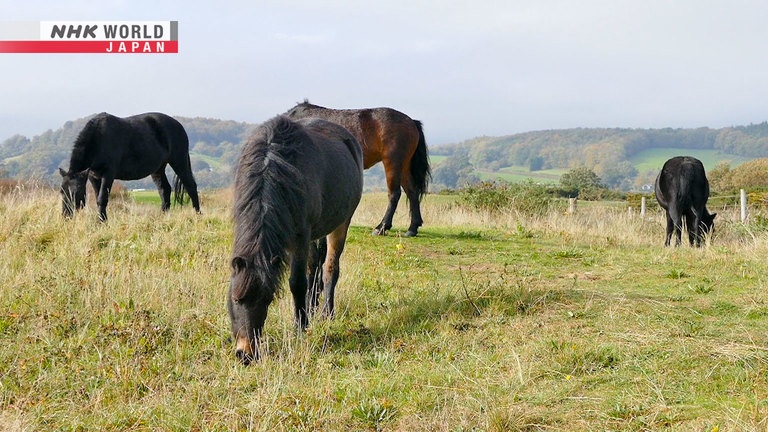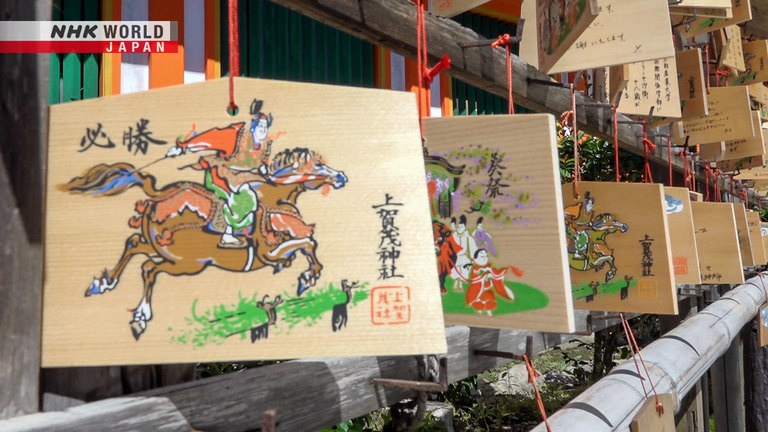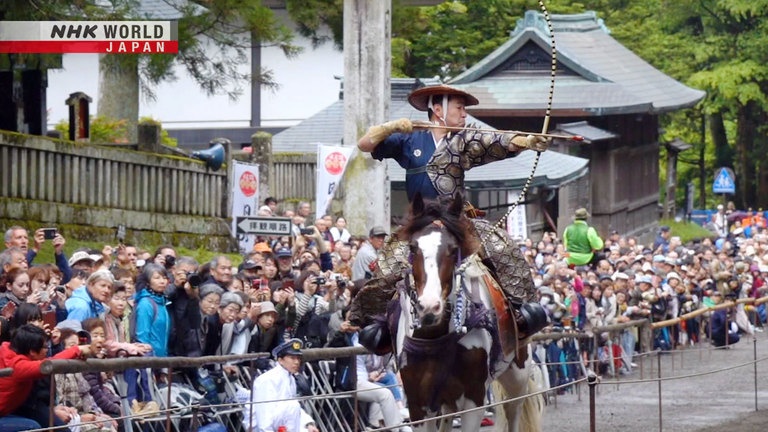Horse
The Japanese language is rich in words and expressions influenced by nature, history and culture. This episode looks at words related to horses. Since arriving from the Asian mainland around the 5th century, horses have played a major role in transportation and farming in Japan. The Japanese considered their horses as a part of their family. From his home in Kyoto Prefecture, poet and literary translator Peter MacMillan guides us through words involving horses and the culture behind them.




Transcript
"Yukigesho."
"Karakurenai."
The Japanese language is rich in unique expressions that reflect nature and culture.
Magical Japanese.
Today's theme is "uma," or "horses."
Hello, I'm Peter MacMillan.
It's believed that horses first came to Japan around the 5th century.
Since arriving from the Asian mainland, horses have played a major role in transportation and farming.
The Japanese considered their horses as a part of their family.
Let's have a look at some Japanese expressions involving horses.
"uma ga au."
"Au" means to fit or to match.
"Uma ga au" originally meant a horse and its rider were in perfect sync.
Now, it's used to describe people who get along very well with each other.
They're from completely different backgrounds, but surprisingly, they're always together.
It looks like "uma ga au" - they get along well.
"uma ga au."
"rachi ga akanai."
"Rachi" is a fence surrounding a farm, and "akanai" means "does not open."
"Rachi ga akanai" literally means a horse cannot roam freely because of a fence.
Today, the phrase is used widely in daily conversation, when something is stuck and can't move to the next step.
For example: The boss isn't on board with our plan.
"Rachi ga akanai" - things are going nowhere.
"rachi ga akanai."
"michikusa o kuu."
"Michikusa" is grass growing on the side of the road.
"Kuu" means "to eat."
Once a horse stops to chew on grass, it won't budge.
Now, the phrase is used when someone is distracted and wastes time on the way to their destination.
He always comes home late.
It must be because he "michikusa o kuu" - dawdles with his friends.
"michikusa o kuu."
When horses were used on farms for agriculture, they were always kept in sight of their owners.
In some regions, horses did not even have their own stables, but were given a place to live inside the family home.
There is a festival in the Tohoku region that symbolizes this strong bond between humans and horses.
Chagu Chagu Umakko is a festival held in Iwate Prefecture, in northeastern Japan.
In June, after the rice-planting season, people walk up to 100 horses in elaborate ceremonial dress, along a 12-kilometer route to a local Shinto shrine.
The festival is held to honor the horses' hard work and pray for their health, as if they were members of the family.
There are festivals like this all around the world.
In Spain, there is a festival honoring horse riding, known as the Jerez Horse Festival.
In Mongolia, the Naadam games are held throughout the country and feature a 30-kilometer horse race.
My home country, Ireland, is also famous for horses.
And my family always kept horses and ponies and we treated them with special importance.
My father always said to us, "feed the horses before you feed yourselves."
In Japan, there are some unique expressions that came about from living in harmony with horses, and the culture of seeing them as part of the family.
"jajauma."
"Jaja" means a spoiled child or someone who acts selfishly.
This gave rise to "jajauma."
Originally, this word referred to an untamed horse.
Eventually, it also became a way to describe people.
Their kids are all "jajauma" - they don't listen to what anyone says.
"jajauma."
"yajiuma."
"Yaji" refers to jeering or heckling.
"Yajiuma," meanwhile, describes people who gather to gawk or cause a disturbance for their own entertainment.
A celebrity appeared in the neighborhood and a crowd of "yajiuma" - curious onlookers - gathered.
"yajiuma."
In English, the sound that a horse makes is "neigh."
[imitate neighing] But in Japanese, the sound that a horse makes is "hihi."
Here's another onomatopoeia related to horses, used to describe the sound of trotting horses.
"paka paka."
"Paka paka." Such a cute sound!
Of course, in modern Japan, people do not have many opportunities to see a horse, or to listen to them walking.
However, there is a place where people can see horses represented in traditional cultural artifacts.
In the past, shrines and Buddhist statues were erected to mourn the passing of horses, who played such a important role in the lives of the people.
"bato kannon."
This "kannon," a Buddhist deity, is said to protect horses.
It wears a horse's head like a crown.
"Ba" is another reading for the kanji character for horse.
"Bato kannon" were built to wish for the horses' health, and to pray for the souls of horses that died before being retired.
And here is one item related to horses that can be found all over the country.
"ema."
"E" means picture.
And "ma" is derived from "ba," or horse.
"Ema" are wooden tablets with a depiction of a horse.
People offer them at shrines to pray for something or to express gratitude for an answered prayer.
Their origins can be traced back to the ancient custom of offering live horses.
During the Heian period between the 8th to 12th centuries, they began to be replaced with drawings of horses.
Today, "ema" come in a wide variety of designs.
"ema."
People write wishes and prayers on "ema" hoping for success at school, in love, and so forth.
I wrote that I hope the viewers of this program will come to love Japanese.
"yabusame."
In this religious ceremony, a rider shoots arrows at three targets on horseback.
It began in the Heian period, between the 8th to 12th centuries, as a form of horseback archery.
Later, samurai warriors performed it as an offering at shrines.
"Yabusame" is a sacred event held at shrines all over Japan.
"Yabusame" is a traditional martial art that is performed to pray for peace and abundant crops.
There is a phrase related to "yabusame."
"jinba ittai."
"Jin" means person.
"Ittai" refers to a state of unison.
The word describes a horse and rider in perfect coordination.
They are racing "jinba ittai" - as one.
"jinba ittai."
That's it for today.
I hope that through this program you can see that humans and horses have lived in harmony since the beginning of history.
See you next time.
Bye.